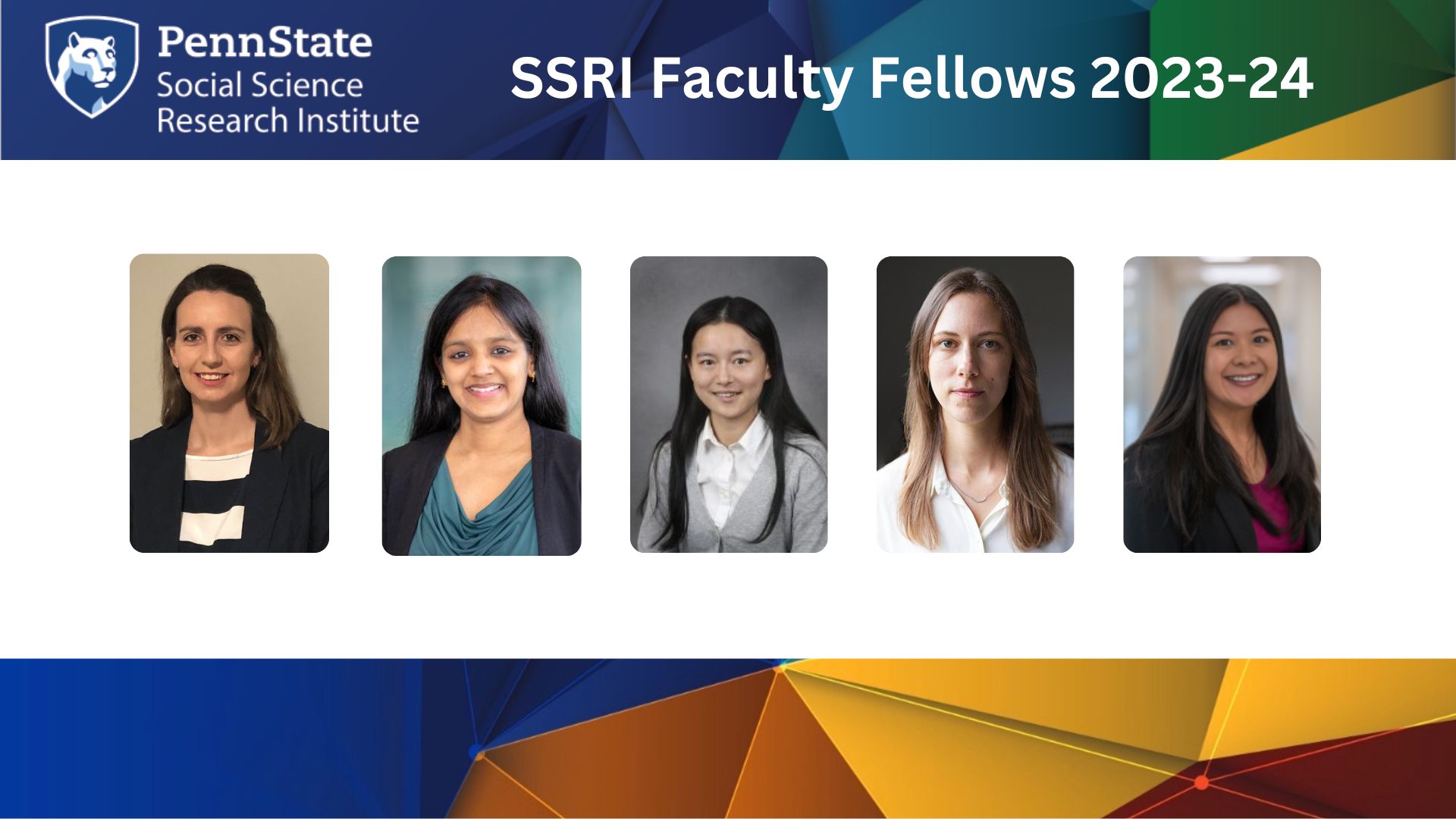
Five Penn State faculty members were recently named Social Science Research Institute (SSRI) Mentored Faculty Fellows for 2023-24. The mentored faculty fellows program supports the career development of early career Penn State faculty in social and behavioral sciences to engage in new areas of research and/or the development of new interdisciplinary collaborations aimed at building sustainable research and securing external funding.
The 2023-24 SSRI Fellows are:
Jimena Cosso, assistant professor of education, College of Education
The fellowship will support Cosso’s research to advance knowledge of Latine parents' engagement with their children at home in mathematics. Her goal is to address educational inequalities by improving the commonly used measures to assess the home mathematics environment that do not consider cultural differences. Cosso will focus on creating partnerships with Latine communities in the area and conduct confirmatory factor analysis of a new scale that she developed to properly measure the home mathematics environments of Latine families.
Sudha Veturi, assistant professor of biobehavioral health, assistant professor of statistics, College of Health and Human Development and Eberly College of Science
Veturi will use fellowship support to acquire the additional training and knowledge she will need to understand the biological underpinnings of stress and its temporal relationship with neurodegeneration. Her long-term goal is to establish an independently funded research laboratory that conducts scientific research at the intersection of statistics, genetics, clinical/biomedical informatics, and neuroscience to solve challenging public health problems, particularly neurodegeneration due to aging. Veturi also aims to develop scalable statistical methods and computational workflows that can handle multimodal datasets and conduct high-quality research that is dedicated to improving cognitive health in aging population in tangible ways, especially among high-risk underrepresented groups.
Hanyi Min, assistant professor of psychology, College of Liberal Arts
The fellowship will support an interdisciplinary project that aims to understand workplace stressors experienced by homecare workers. Min will study these workplace stressors to develop interventions to reduce negative impacts. She also plans to use inductive methods, such as interviews, to understand the unique stressors of homecare workers. Building on the information collected in the interviews and the theoretical frameworks, Min will develop a framework of potential job demands and job resources for homecare workers to develop a job crafting intervention to reduce negative impacts.
Emily T. Rosenman, assistant professor of geography, College of Earth and Mineral Sciences
Rosenman will use the fellowship to support a project seeking to ascertain the geographies of the opioid industry’s marketing strategies and how the industry’s corporate and financial decision-making are related to opioid-related health outcomes. In particular, the project will make use of a new trove of corporate documents released from opioid litigation and made public via University of California San Francisco and Johns Hopkins University libraries. These data will be analyzed alongside secondary data on opioid-related health outcomes, such as mortality and overdose data, to propose an understanding of how corporate strategy may be related to geographic variation in opioid-related health outcomes. The project seeks to eventually inform policy on how legal settlements with pharmaceutical companies, as well as other efforts, could address the geographies and outcomes of the opioid epidemic.
Nina Lauharatanahirun, assistant professor of biomedical engineering, assistant professor of biobehavioral health, College of Engineering and College of Health and Human Development
The fellowship will help support a project program to develop an innovative interdisciplinary computational framework to discover key neural, behavioral, and social mechanisms underlying adolescent development of health risk behavior. Lauharatanahirun’s research will be centered on developing novel computational models that predict real-world health risk behaviors such as substance abuse, unprotected sex, and distracted/impaired driving. This work will help her to identify different types of social interactions that make adolescents more vulnerable to health risk behaviors and subsequent negative health outcomes and inform future prevention and intervention efforts.
Over the past 15 years, the SSRI Faculty Fellows Program has supported 51 faculty members from nine colleges and 21 departments and continues to make significant contributions to the institute’s research portfolio at Penn State. More information, including the application process, can be found at the SSRI Faculty Fellows program website.